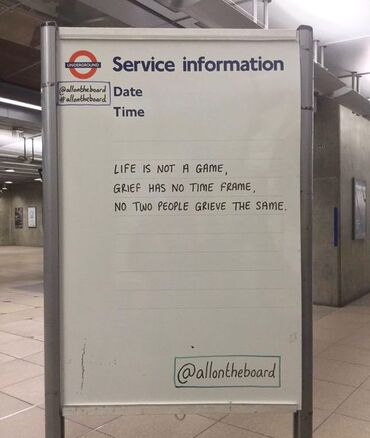 In my early days of grief, everything was a blur and nothing seemed real. I had incredible amounts of support from my parents-in-law, my family and my friends, but there was still a tremendous amount to do – arranging the funeral, and doing the 'death paperwork', with everything from closing bank accounts to cancelling the dentist. And then I started to wonder, or even worry, that I wasn't grieving properly. I was grieving too much. Or too little. I was coping too well. Or I wasn't coping well enough. Reaching out to the wonderful people at Widowed and Young made me understand that there's no right way to grieve. And generally, there's no wrong way to grieve either. The way that you are grieving – that's the right way to grieve. Grieving lasts as long as it lasts, and in some ways it lasts for always, as we don't want to forget the people that we loved, and still love. But it does change. It gets less raw. And we learn to live alongside our grief. People have developed many models of grief to try to understand what we go through when we lose someone, and what can help us. I have written blog posts about a number of different models. The dual process model and growing around grief are the ones that helped me most, but it's important to remember that these are just models, and not rules, and different models can help different people. Having said that there is no wrong way to grieve, and no set time that grieving lasts, a small group of bereaved people develop what's called complicated grief disorder. This includes exaggerated grief symptoms over a long period, sometimes years or decades, and a feeling of being trapped in grief. Complicated grief overlaps with depression and post-traumatic stress disorder. Talking to a psychotherapist might help – it certainly helped me when I had signs of PTSD after Tim's sudden death.
0 Comments
Leave a Reply. |
AuthorI was widowed at 50 when Tim, who I expected would be my happy-ever-after following a marriage break-up, died suddenly from heart failure linked to his type 2 diabetes. Though we'd known each other since our early 20s, we'd been married less than ten years. Archives
July 2024
Categories
All
|


 RSS Feed
RSS Feed